8 Easy Games to Play in a First Piano Lesson
This post may contain affiliate links. If you purchase something through an affiliate link, I will receive a small commission at no cost to you. For more information, read the disclosure statement here.
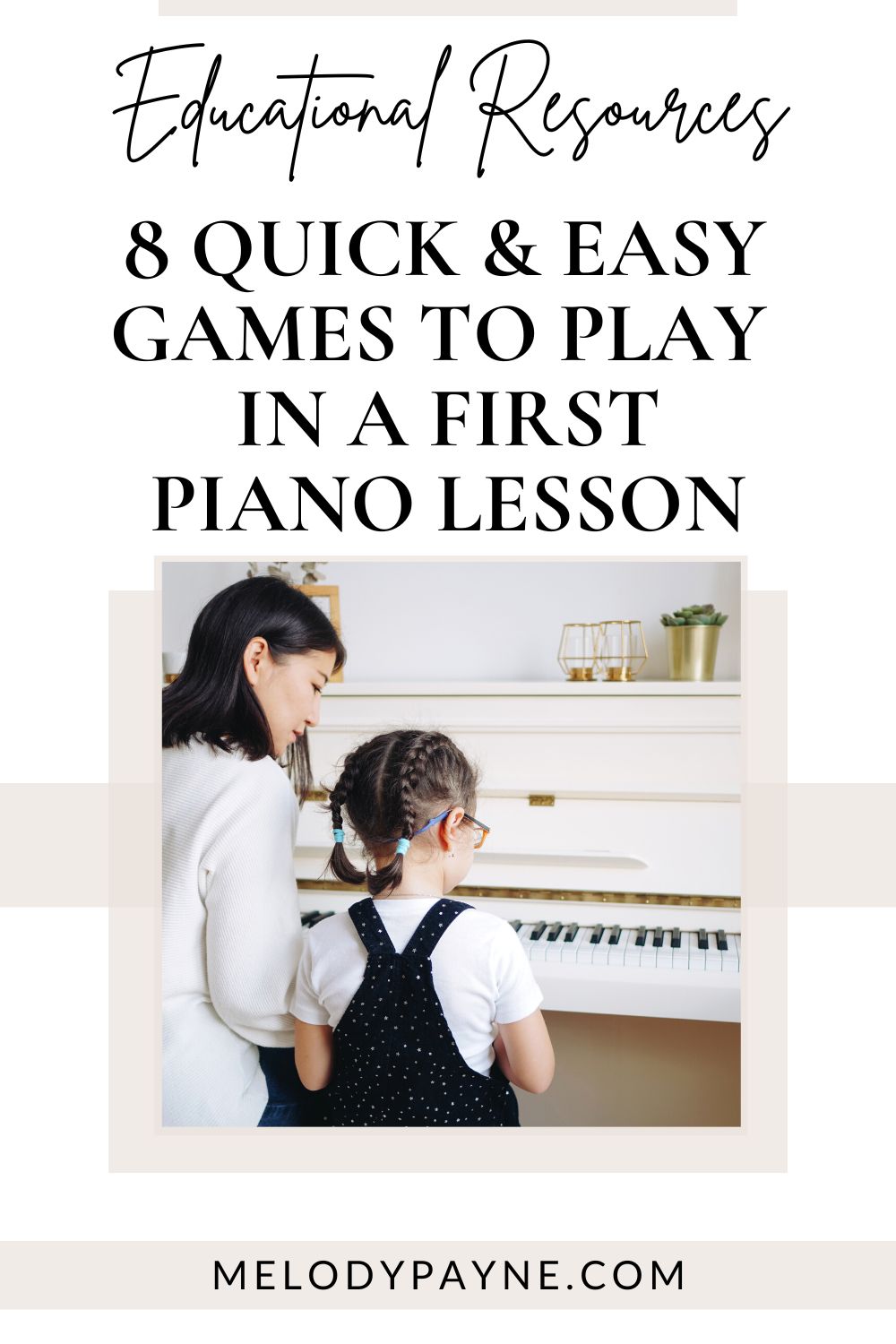
Life as a piano teacher can be pretty demanding at times. If you feel like you’re spending all of your spare time trying to plan the perfect piano lesson for your new beginners, you’re not alone.
We do our best to wow our students with easy games to play in a first piano lesson, but we often aren’t sure if the games are meeting our students’ (or our!) expectations.
The first piano lesson can be so packed with other activities that you might feel like you don’t have enough time for a game.
You wonder if the student will even like the game. And you begin to wonder if games are really all that helpful.
Does this sound familiar? Are you nodding your head right now?
I’m happy to tell you that games in piano lessons ARE incredibly helpful, your students will LOVE them, and if you have 3-5 minutes, then you DO have time for a game!
I’m going to introduce you to 8 quick and easy games to play in a first piano lesson.
These games are packed with musical benefits, will help build rapport and trust between you and your new piano students, and will help you feel like the amazing piano teacher that you are.
Why is it important to choose educational games to play in a first piano lesson?
Choosing first piano lesson activities for our brand new beginners is important for a number of reasons, and choosing the best games to play in a first piano lesson doesn’t have to be hard.
Carefully curating and selecting the right activities can set the stage for an exciting and successful musical journey for our beginning piano students.
Read about my favorite 9 essentials to include in the first piano lesson.
Here are several reasons that it’s important to choose educational games to play in a first piano lesson.
- Children learn best through play.
- Games solidify essential beginning piano concepts in a way that is fun for students.
- Feeling confident in these concepts increases student motivation.
- Playing games in the first lesson can capture and hold the interest of new piano students.
- Learning the concepts and reviewing them in games ahead of time helps students feel successful when you begin teaching them from their “lesson books”.
- Making the first lesson fun makes piano lessons feel accessible and less scary for young students who may be hesitant.
- Sitting on the bench for 30 minutes is a LONG time for a young child, and an off-bench activity can be an excellent break!
- Games can help you introduce musical concepts in age-appropriate ways, following the developmentally-appropriate framework of learning outcomes as presented in Bloom’s Taxonomy.
What musical concepts are excellent to teach in a first piano lesson?
I always like to include four major aspects of musicianship in every piano lesson I teach, starting with the very first lesson:
- Pitch
- Rhythm
- Dynamics
- Articulation
Although I don’t specifically tell my students what each term means, at least not yet, I always keep the terms in mind as I introduce each element during the lesson.
Here’s a closer look at what’s going on in my mind as I approach each of these essential musical elements as I’m deciding which games to play in a first piano lesson.
You’ll notice that each of these elements has “opposites”, which makes it easier when we’re describing them to our students in age-appropriate and developmentally-appropriate ways.
How do I define Pitch?
Pitch includes anything related to how high or low a note sounds, or how high or low a note appears on the staff. We often refer to pitches as “notes”.
How do I define Rhythm?
Rhythm includes anything related to the long and short sounds within a steady beat in music, including meter, tempo, and much more.
How do I define Dynamics?
Dynamics are the loud and soft sounds, and all variations of loud and soft, within a piece of music.
How do I define Articulation?
Articulation is the way a specific note is played; the way the note is “spoken”. This includes separated or connected sounds such as staccato, legato, and many more variations.
What beginning piano games can help solidify pitch, rhythm, dynamics, and articulation?
There are so many wonderful games to play in a first piano lesson that the options can become overwhelming very quickly!
When planning a first piano lesson, keeping the four major concepts at the forefront narrows down the game options to a much more manageable number.
Here are several games to play in a first piano lesson that teach absolute beginning piano concepts, within the curricular umbrella of the four major music concepts of pitch, rhythm, dynamics, and articulation.
Beginning piano games that reinforce pitch
When looking for pitch-related games to play in a first piano lesson, I begin by breaking “pitch” down into the most simplified version of itself possible.
For example, pitch can include high and low, right and left hand (directly related to high and low), piano keys, and the music alphabet (the precursor to pitches on the staff).
For beginning piano students in their first lesson, here are some games related to pitch that they can play.
- High and low
- These beginning piano Boom Cards™ are great for practicing high sounds and low sounds
- New to Boom Cards™? Learn all about Boom Cards™ in my tutorial.
- Right hand and left hand
- Zombie Says is an activity that can be used to review right hand and left hand.
- Adapt the game to review ONLY right hand and left hand by saying “Zombie says walk like a zombie and wave, raise, wiggle, etc., your right hand”.
- Beethoven Says is similar to Zombie Says, and it is another easy-to-use game that reviews right and left hand.
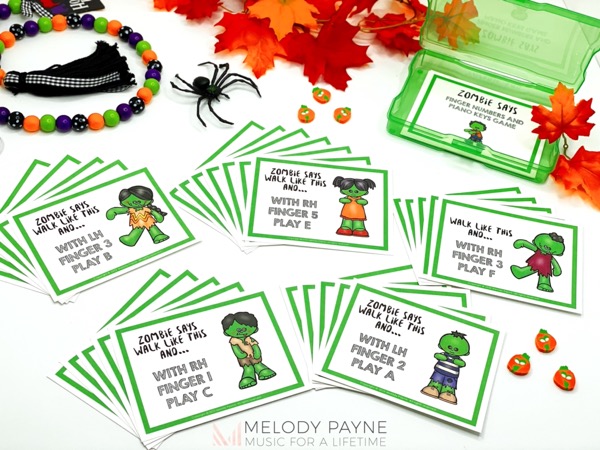
- Piano keys
- Beethoven Says and Zombie Says are also perfect for reviewing piano keys.
- This cute set of rocket beginning piano Boom Cards can help students practice identifying the white piano keys.
- See how I teach piano keys to beginners in my free piano key geography workshop.
- Music alphabet
- This free set of music alphabet games will give your students a variety of hands-on ways to practice the music alphabet.
- These are probably some of the quickest and easiest games to play in a first piano lesson!
Beginning piano games that reinforce rhythm
- Beginning rhythms
- If you need a fun rhythm activity for pre-schoolers, the first activity in this fun pack of pre-school rhythm activity cards is great for the first piano lesson.
- Get some great ideas for using the pre-school rhythm activity cards.
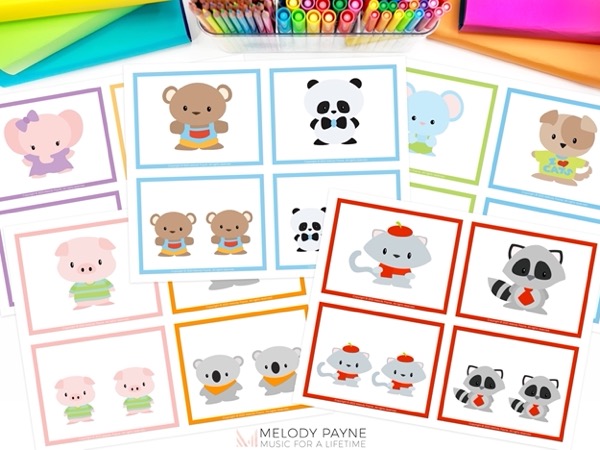
Beginning piano games that reinforce dynamics
- Loud and soft
- This delightful deck of Boom Cards™ reviews loud and soft by having students listen to a sound they might hear if they are on a rocket in outer space, then choose whether it is loud or soft.
- This game does include the piano and forte symbols, but you could easily play it just by having the student listen to the sound, then tell you if it’s a loud sound or a soft sound.
- This is consistently one of my students’ favorite games to play in a first piano lesson!

Beginning piano games that reinforce articulation
- Finger numbers
- Zombie Says and Beethoven Says are both great games to play in a first piano lesson. They review piano keys, which is the most basic part of articulation, as well as finger numbers.
- I Have, Who Has? reviews piano finger numbers (and right hand and left hand) away from the piano, strengthening the student’s ability to recognize and identify them.
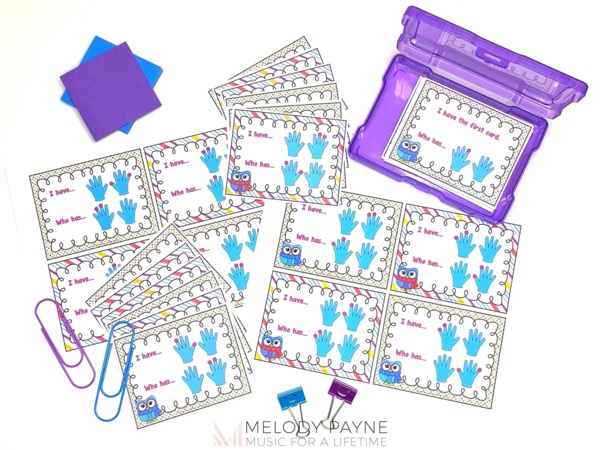
- Long and short sounds
- In addition to using Zombie Says and Beethoven Says for piano keys plus finger numbers, you can also incorporate basic articulation terminology such as “play the A with a short sound”.
- This will encourage physical and aural discernment between different types of articulation.
How to incorporate games into a first piano lesson:
In addition to teaching a first piano lesson, we are also establishing the rules and expectations for our studio through everything we do, even when playing games.
The more specific we can be in our directives, especially when introducing fun and engaging games to play in a first piano lesson, the more likely the student will feel successful when correctly following each one.
- Plan ahead. Decide what game you want to play in a lesson.
- Prepare the game materials so they are within reach and ready to go.
- Teach the musical concept prior to playing the game.
- Establish rules and boundaries so the student knows what to expect and do (we will sit on the floor for this game, we will go to the whiteboard for this game, we will not pick up the iPad, etc.).
- Determine how long it will take to play the game. Five minutes or less is ideal, especially for children ages 5-6.
- Include lots of giggles!
- Does the winner get a prize? A sticker? A cute sticky note?
Now that you have some terrific game ideas that teach and reinforce essential pedagogical concepts, plus tips for games to play in a first piano lesson, what are you waiting for?
Choose some of these easy beginner games to play in a first piano lesson so you can finally feel calm, cool, and in control of every aspect of that first lesson and make your new students eager to come back for more.
Even more engaging games for beginning piano lessons:
These fun and interactive options are terrific pedagogical games to play in a first piano lesson. Try them with your beginners and see just how easy it is to help your new students thrive!
After a few weeks have passed, your beginners will be ready for more beginning piano resources. Here are a few beginning piano activities they’ll love:
- Here are a variety of music games and activities for beginning piano lessons.
- Your students will love these beginning piano Boom Cards™.
- Beginning piano games such as Piano Keys Spelling Bee will be a hit with your students!
- These beginning piano worksheets were created with your beginning piano students in mind.
Keeping beginning piano games organized and at your fingertips!
Watch this video to see my absolute favorite storage solution for piano games.
This storage box will not disappoint, and it will help you keep all of your games organized and at your fingertips, so you can quickly choose the next engaging games to play in a first piano lesson.

Do you choose specific pedagogical games to play in a first piano lesson with your beginners? Leave a comment and let us know your favorites!
Keep reading even more blog posts to equip you in teaching…
Don't miss out!
Follow on Facebook and Instagram, join the best Facebook group for piano teachers, and subscribe to the newsletter to get helpful teaching tips, resources, and tutorials delivered straight to your inbox every week.
Melody Payne
Melody Payne
Welcome!
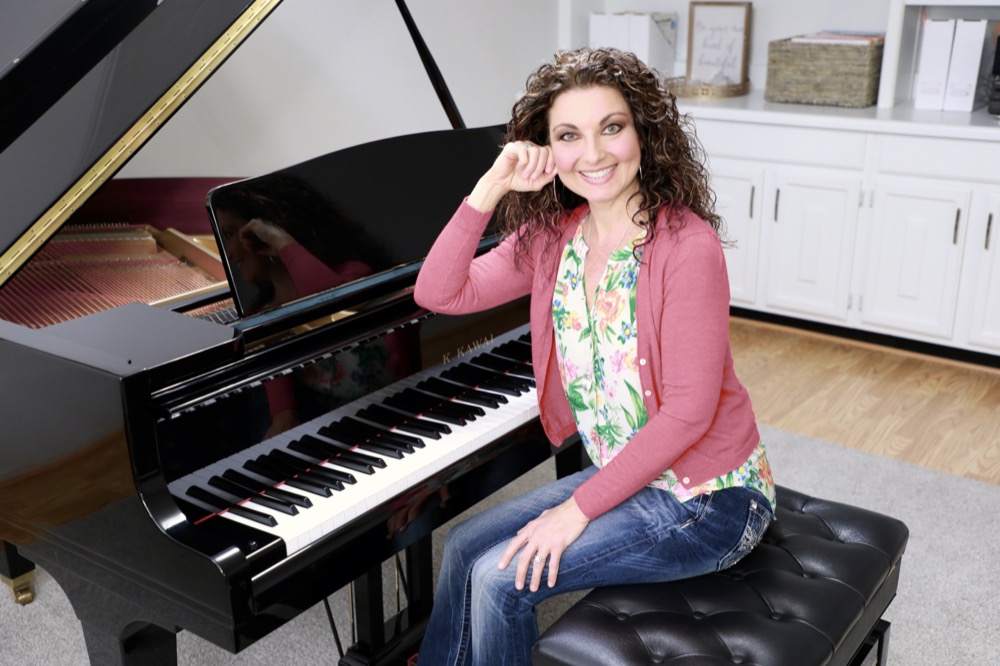
Hi! I’m Melody Payne, a pianist and piano teacher, educational resource author, a fun-loving wife to the most wonderful and talented hubby I could ask for, and a lifelong learner who loves to share. I want to make your life as a music teacher easier by writing and sharing helpful and relevant music teaching articles, and by creating educational resources with your very own students in mind. If you are a parent who wants to enroll your child in piano lessons, I’d love for us to get started building those skills that can give your child a lifetime of musical enjoyment!

